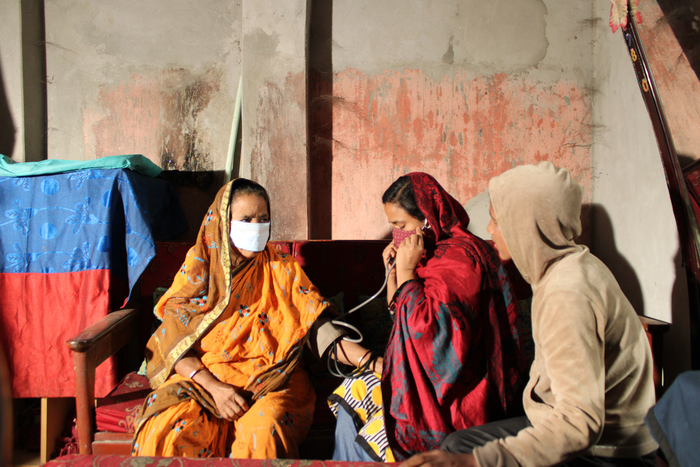Three new publications by Inclusive Futures have revealed how people with disabilities were not only disproportionately and ‘catastrophically’ excluded from COVID-19 pandemic planning and relief efforts, but that representative disability groups were vital in aiding those left behind by the systems that are supposed to support them.

Credit: © ADD International / Inclusive Futures
Three new publications by Inclusive Futures have revealed how people with disabilities were not only disproportionately and ‘catastrophically’ excluded from COVID-19 pandemic planning and relief efforts, but that representative disability groups were vital in aiding those left behind by the systems that are supposed to support them.
Research shows that organisations of persons with disabilities (OPDs) in Africa and Asia worked for months, often without funding, to plug the gaps and provide life-saving support to people left behind by non-inclusive systems. The publications also paint a shocking picture of the devastating impact COVID-19 had on the lives of some of the most marginalised people with disabilities, particularly women and under-represented groups. To try and prevent this happening again, the reports provide learnings for making future disaster responses disability-inclusive.
Lorraine Wapling, Inclusive Futures technical lead, who worked on the research, has said, “We knew this situation was bad for people with disabilities – but when we looked into the detail, it was even worse than we imagined. I was completely in shock. Despite all the hard work by organisations of persons with disabilities, the right to be included in times of crisis, still seems far from being achieved”.
She added, “The disability organisations are the shining light here – we need to turn the spotlight on them, learn from them and ensure their expertise and drive is supported, funded and built on.”
The research shows that disability organisations reported a huge increase in need during lockdowns in each country. They found that many people with disabilities often could not access communications about COVID-19 or were excluded from government food and financial assistance or social protection.
One staff member at an OPD in Zimbabwe reported, “We would receive phone calls from members needing assistance. That’s the thing which gave us sleepless nights, to know that our members are now suffering more and more because there’s no food to put on the table and they don’t know what is going on. Especially those with hearing impairments [who could not access information]”.
OPDs in the countries also reported being sidelined when it comes to decision-making and funding. With a lack of funds and personnel due to the pandemic, many groups found themselves unable to respond to increased calls for support from people with disabilities.
An OPD representative in Bangladesh said, “[I have] zero staff. I’m alone in the organisation. If the situation improves maybe the staff will come back. People with disabilities are treated as a burden. They have lost support from society. As an OPD we are concerned about how they will be supported”.
Globally, about one in five people are disabled, but data on the impact of COVID-19 on people with disabilities is limited and many people’s experiences are not fully recorded or understood. The new research has filled vital gaps in evidence from Bangladesh, Kenya, Nepal, Nigeria, Tanzania and Zimbabwe.
In the published recommendations the authors have urged governments and development and humanitarian actors to consult with both organisations of people with disabilities and people with disabilities themselves.
They are also calling for data to be properly collected and used to ensure no one is left behind in disaster responses. And that information generated is available in accessible and relevant ways to the people it affects. The Learning Report provides tangible learnings and lessons on how humanitarian actors can inform their operations in future disasters.
Susan Pieri, Associate Programme Director for Inclusive Futures, said, “Experience shows that it is more effective to plan for inclusion rather than react. Lessons learned in our COVID-19 response can be directly applied to ensure future crises response and recovery is disability inclusive”. We know these lessons have been found before – but the simple fact of the matter is that people with disabilities are still being left behind and these lessons still aren’t being learnt by the sector”.
Pieri added, “There are more than one billion people with disabilities worldwide, that’s around 15% of the global population – we can’t continue to let down such a huge number of people in disaster response.”
The three sets of research and learnings were compiled as part of Inclusive Futures, a flagship disability development inclusion program funded by UK aid. It brings together global leaders and specialists from 16 organisations to improve access to work, education and healthcare, and tackles stigma and discrimination faced by people with disabilities. The programme reached over 60,000 people with aid during COVID-19 lockdowns.
To view all of the research and learnings, or to find out more about Inclusive Futures, please visit, www.inclusivefutures.org/learning-from-covid-19.
Subject of Research
People




